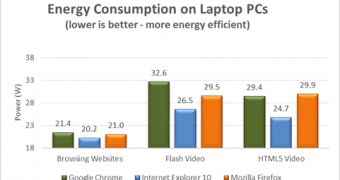The launch of a new study conducted by the Center for Sustainable Energy Systems was the perfect occasion for Microsoft to step in front of the media and praise its new Internet Explorer 10 browser.
According to the provided findings, Internet Explorer 10 is the most energy-efficient browser on Windows 8, using less energy than Google Chrome and Mozilla Firefox to display a large number of websites.
IE10 uses 18 percent less energy, which means that “if every Google Chrome and Mozilla Firefox user in the United States switched to Internet Explorer 10 on Windows 8 for a year, the energy saved could power over 10,000 households in the United States for that year,” as Microsoft explained in a post.
In order to determine which is the most efficient browser, researchers measured the energy consumption when browsing the most popular websites in the United States and while playing video content through Adobe Flash and HTML5 videos.
“In the above scenarios, Internet Explorer 10 exhibited the lowest energy consumption. In some scenarios such as playing Adobe Flash video on laptop PCs, it was 18% more energy efficient than Google Chrome, and it was 17% more efficient than Mozilla Firefox in playing HTML5 video,” Microsoft explained.
Of course, the tech giant has used the occasion to tells us that by simply dumping Chrome and Firefox and moving to Internet Explorer 10 for just one year, users would save over 120 million kWh in electricity.
“This is enough energy to power 10,722 households in the United States for an entire year [and] would eliminate the release of over 85,000 metric tons of Carbon Dioxide equivalent in greenhouse gas emissions,” it said.
Now, we’re pretty sure that energy consumption could hardly be a reason to choose one browser over another, but since Microsoft really wants to make IE10 more popular than its rivals, let’s all take this for granted and admit that power consumption is indeed vital for our lives.

 14 DAY TRIAL //
14 DAY TRIAL //